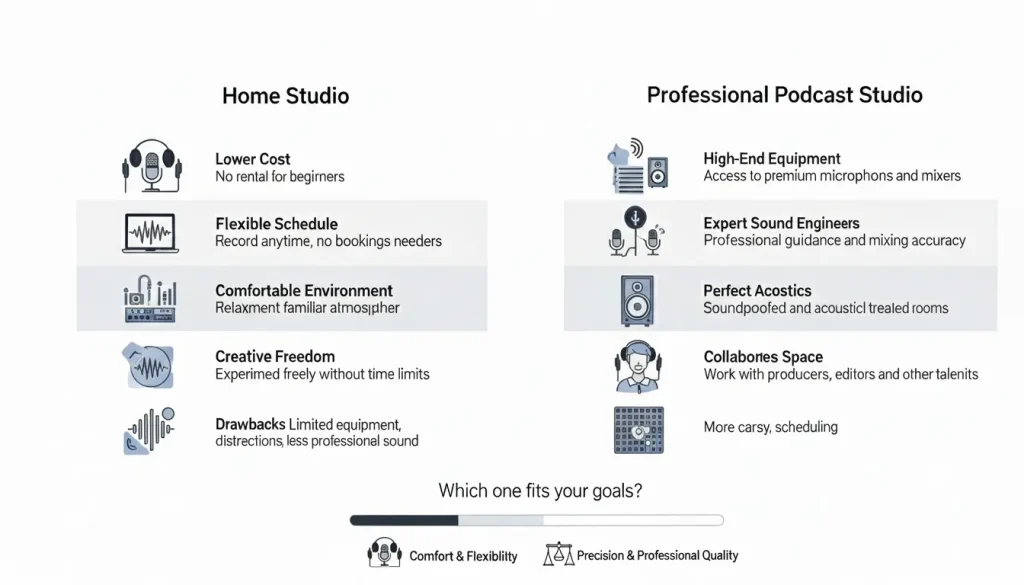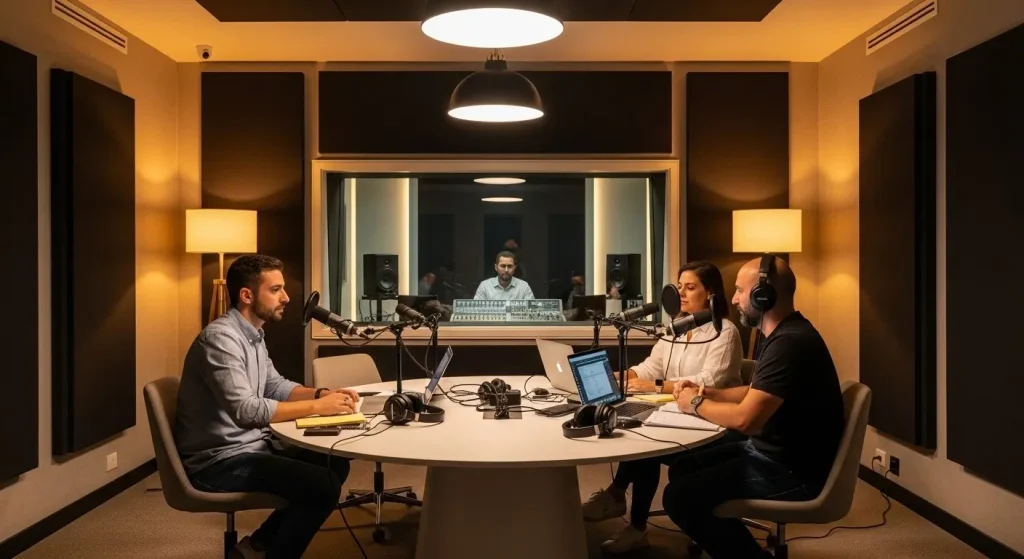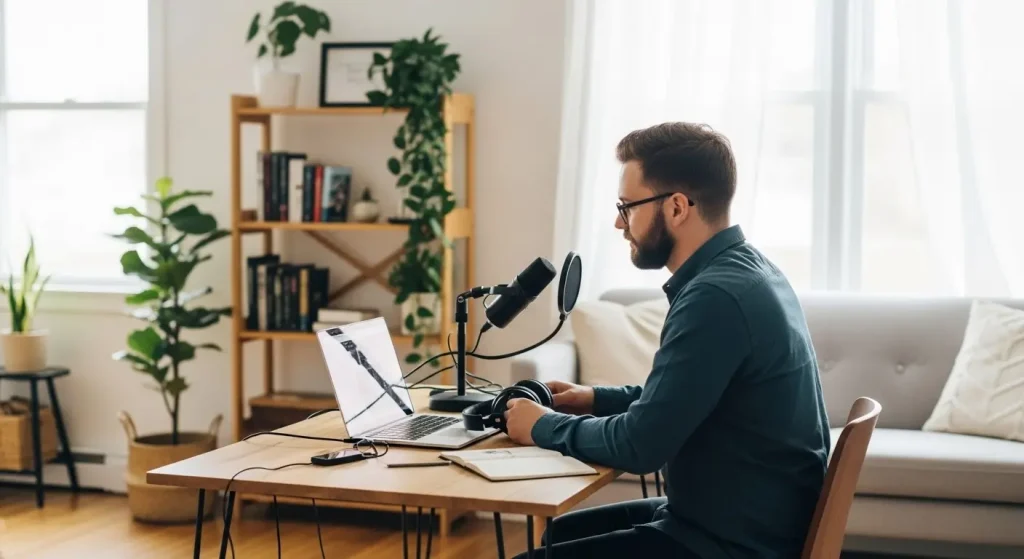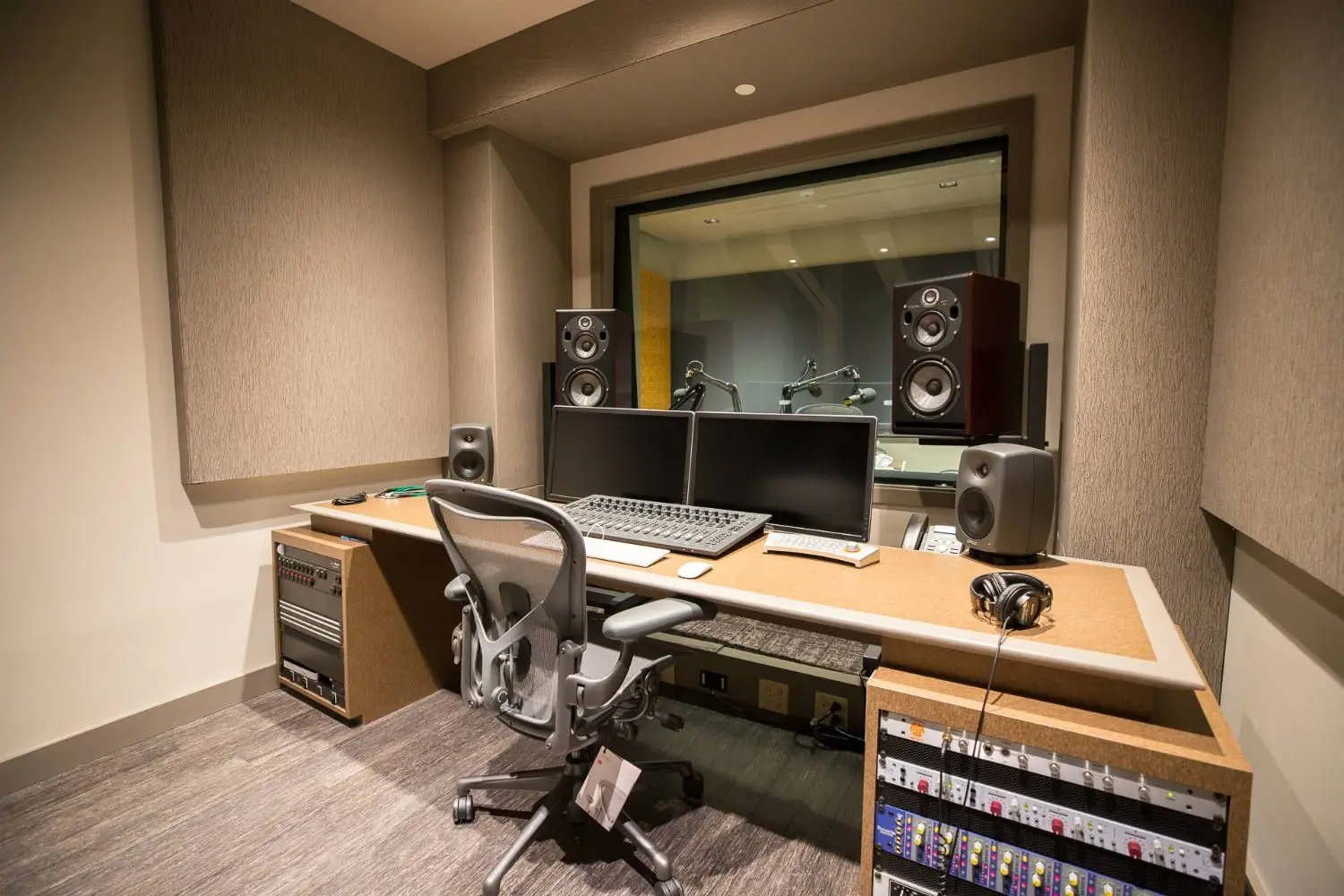Digital recording has developed at a remarkable rate in recent decades because of the tremendous advancements in technology. Working in a professional song recording studio has certain advantages that can improve the quality of your recordings beyond what most home setups can accomplish, even if many artists appreciate the convenience of home studios, which range from basic PCs and controllers to complete sets. It’s crucial to weigh the benefits of Home Studio vs Professional Podcast Studio. In this article, we will completely dive into the difference of podcast studio vs home setup.
DIY Podcast Studio vs Professional Rental
Nowadays home studios and professional studios are marginally different just because of the technology and the cost of everything you can get in your home studio. In this article we are going to go over five things that might not be in your home studio but where you can go and get those things or at least find them at an affordable cost to make your home studio more professional.
Skilled Sound Engineers
The most important is your listening environment. How well you can hear the sound of what you’re making. Because at the end of the day, you are making music, and you need to have the right environment to actually hear what you’re making.
In all professional studios, you’re going to have a control room or maybe a mixing room, where you can actually see or not see but hear the actual sound of what you’re making, and it’s perfectly treated the room where you’re getting the actual result and what’s coming out of the speakers.
In a professional studio, you can have a set of PCM speakers, which can range from between 10 thousand dollars up to 20 thousand dollars. A lot of professional studios will have these type of speakers or different brands. Furthermore, two sets or one set of mixing speakers. Not only the speakers, the room should be fully treated. So, there’s no like reverberation. So, you’re really getting the actual sound of what you’re making and what your song is about.
Also, in the professional podcast studio, there are acoustic panelings everywhere. There should be bass traps in all corners and there should be acoustic panelings on the ceiling as well. Also carpeted floors so it’s dry enough.

Why should consider home studio too?
Recording music at home requires basic audio equipment and software. It enables musicians to produce and record music without requiring a professional studio. But you should consider that, renting studio space and hiring sound engineers are necessary for a professional studio. Let’s look at the reasons why you should consider home studios, too:
1. Money management
Commercial studio time may be expensive, particularly for independent musicians or those just getting started. Once set up, a home studio eliminates the need for hourly fees, making it an affordable option for recording many songs or even full albums. While there is an initial investment in equipment, this approach can result in considerable cost savings over time.
2. More privacy means more coziness
Recording at home offers a degree of comfort that is difficult to match elsewhere. You’re in a comfortable setting where you can unwind and concentrate on your music without feeling the strain that often comes with working in a professional studio. This comfort level can lead to more genuine and passionate performances.
3. Flexibility
Home studios provide remarkable flexibility. You may record whenever you feel inspired, without having to arrange studio time or work around other people’s schedules. This flexibility is especially advantageous for musicians who balance music and other duties, allowing them to schedule recording sessions around their life rather than the other way around.
4. Creative independence
The last but not least major advantage of home recording is the creative flexibility it provides. You’re not constrained by the schedule of a professional studio, so you may take your time experimenting with alternative sounds, arrangements, and recording approaches. Whether you’re working on a late-night idea or fine-tuning a mix over many days, a home studio allows you to go at your own speed.
You might be in your bedroom, maybe in your living room. It might be in your kitchen. Whatever, your listening environment might not be that good or might not get to this level. However, you can make it pretty much good, and you can do that by just getting some foam and making sure that the corners are filled with foam. Because these are going to be where the base is really booming, and it can really make your room sound muddy
Bouncing and the phasing issues in your room are making your listening environment not as quality as it could be.
But as you know, considering home studios might have some cons too. As a result, knowing all the cons of it could help you to make a better decision.
What are the disadvantages of considering home studios?
1. Equipment constraints
While technology has made home recording more accessible, professional studios retain an advantage when it comes to high-end equipment. The microphones, preamps, and outboard gear used in high-end studios might be too expensive for a home setup. As a result, the quality of your recordings may be restricted by the equipment you have available.
2. Distractions
Distractions might be difficult to avoid when recording at home. Whether it’s family members, housework, or the urge to delay, staying focused can be difficult. Unlike a professional studio, which is built to stimulate creativity, a home studio demands discipline to avoid distractions.
3. Limited Collaboration
In a commercial studio, you have access to engineers, producers, and other artists who may offer useful advice and critique. Recording at home might be a more private experience, perhaps limiting your exposure to fresh ideas and viewpoints. While remote collaboration is an option, it does not always match the immediacy and spontaneity of working with others in person.

Why are professional studios better?
A professional studio like what agencies offer is much more sufficient for those who are looking for more professional work! But it has some pros and cons that, before anything else,e you should take into account;
1. Professional means sophisticated equipment
Professional studios generally provide additional equipment. A professional recording studio, due to its larger expenditure, provides access to high-end or vintage microphones, analog consoles, professional preamps, and, most importantly, soundproofed and acoustically treated locations meant to capture every aspect of an instrument’s performance.
Many have numerous rooms so that different instruments may be recorded simultaneously. Furthermore, the experience of the engineers, session musicians, and music producers who work in these facilities adds enormous value to the final product’s quality.
2. Larger space, better acoustics
Professional studios provide acoustically designed facilities, cutting-edge studio equipment, and, most importantly, personnel who understand how to use these spaces and equipment successfully. The specialization of each space for distinct purposes (recording, mixing, and mastering) gives versatility and sound quality that are seldom seen in home studios.
3. Working with experts and creative results
The structure of a professional studio encourages efficiency and collaboration with audio recording pros, which may surely improve your project, increase creativity, and provide fresh insights that enhance your song. On the other side, optimal venues may spark creativity and give visual tools for advertising your music on Spotify and other media.
Having a professional studio might not be suitable for those who are new to the environment. Because it needs more money to invest in. Breaking the bank in the first phase of work may not be a good choice. So if you are new and want to earn money from this space, consider a home studio as it may be more affordable for you.

Home vs rented studio
The selection between a home studio and a professional studio will be based on your project’s individual demands, your budget, your artistic ambitions, and, most importantly, your expertise in understanding what works best at each step of production.
Sometimes the greatest choice is a hybrid of the two, working online with producers, musicians, and professional technicians. There is no question that there is no one-size-fits-all approach to music production, and for the greatest results, include or entrust experienced specialists with both the technical and post-production processes.
What Sets Professional Studios Apart from Home Setups
The first thing in a professional studio that you likely don’t have in your home studio is the number of preamps, like digital converters, in a professional studio. If you don’t know what any of that means, it’s not that big of a deal! Most home studios have like audio interfaces. You might have a Scarlett two-channel, like the red box or Apogee Duet or an apollo twin where it’s just a box you put your microphone in, and that goes to your computer.
That’s fine, most all the new interfaces have preamps and converters inside the box where in a professional studio, you would likely have a preamp box and then a digital converter box. The chain the microphone runs into the preamp box to the converter box into your computer you can get different types of preamps because they’re going to sound a little different.
Each preamp is going to have a different quality. So, in a professional studio you have a whole stack of preamps with different styles of preamps. Because the preamps also have EQs and you can shape the sound a little before it gets into the converter. Whereas your home studio audio interface doesn’t have an EQ on it. It just amplifies the sound that’s what a preamp does it make it louder, and then the converter changes it to a digital signal. In a result, your computer can understand it.
Why Recording at Helio Beats Any Home Setup?
When picking between a home recording setup and a professional podcast studio, the main differences are precision, skill, and sound environment. Professional studios, such as those at Marketing and Advertising Agency, are designed for clarity and creative quality, with acoustically treated rooms and world-class microphones. Unlike home studios, where space, acoustics, and distractions all restrict performance, Helio’s studios provide pristine, broadcast-ready audio that raises your podcast to a professional level. From lively interviews to branded narrative, every element is recorded with care and affection.
Still, a home setup has its place for flexibility and convenience, but when quality, consistency, and brand image matter, a professional recording space makes all the difference. At Helio, podcasters benefit not only from advanced equipment and pristine acoustics, but also from a collaborative creative environment that inspires confidence and productivity. Whether you’re an independent creator or a corporate brand, Helio bridges the gap between comfort and professionalism, helping you sound your best every time you hit record.
Bottom-line
While home studios are convenient, flexible, and inexpensive, nothing beats the accuracy, acoustics, and creative energy of a professional setup. Helio doesn’t just record podcasts; they’re developed. With top-tier equipment and an inspirational environment, you may achieve the sound quality and confidence that distinguish genuine pros. Helio can help you convert every recording into a world-class production, whether you’re just getting started or trying to establish a worldwide audience.
FAQ
What makes Helio’s podcast studios different from recording at home?
Helio studios are professionally designed with advanced acoustics and premium microphones, ensuring crystal-clear, broadcast-quality audio that most home setups can’t achieve.
Can beginners or small creators use Helio’s studio?
Absolutely! Helio welcomes everyone, from first-time podcasters to seasoned professionals. Our team guides you through every step of the process, so you can focus on your content while we handle the technical side.
Is it expensive to record at a professional studio like Helio?
Helio offers flexible packages to fit different needs and budgets. While home studios may seem cheaper initially, the quality, efficiency, and professional polish you get from Helio make it a smart investment in your brand.
What should I bring when I come to record at Helio?
Just bring your script, ideas, or guests! We provide everything else, from recording equipment and editing tools to a comfortable, creative space that helps you perform your best.





